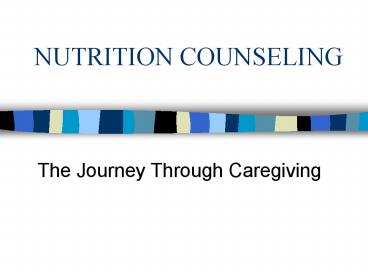NUTRITION COUNSELING - PowerPoint PPT Presentation
1 / 20
Title:
NUTRITION COUNSELING
Description:
NUTRITION COUNSELING. The Journey Through Caregiving. Age-related ... Eat a lunch in the park or on your patio. ... Refrigerate 'doggie bags' within 2 hours. ... – PowerPoint PPT presentation
Number of Views:3475
Avg rating:3.0/5.0
Title: NUTRITION COUNSELING
1
NUTRITION COUNSELING
- The Journey Through Caregiving
2
Age-related changes that affect eating and
nutrition include
- Vision
- Hearing
- Taste and smell
- Thirst
- Body composition changes
3
(No Transcript)
4
(No Transcript)
5
(No Transcript)
6
(No Transcript)
7
(No Transcript)
8
(No Transcript)
9
(No Transcript)
10
Important nutrients for Seniors
- Calcium
- Vitamin D
- Vitamin B12
- Fiber
- Fluids and Water
11
Tips to add some mealtime sparkle
- Eat by a window and use your best dishes for
every day. - Eat a lunch in the park or on your patio.
- Use frozen prepared dinners for added variety and
convenience. - Treat yourself to a meal out.
12
Tips to add some mealtime sparkle, cont
- Invite a friend to a potluck dinner.
- Attend the nutrition program for the seniors and
enjoy meals in the community. - Prepare a new (nutrient dense) recipe each week
and invite friends over for a tasting party.
13
Why are Seniors at risk for foodborne illness?
- Immune system declines with age
- Chronic diseases and surgery can decrease bodys
ability to fight infections - Stomach becomes less acidic
- Digestion slows
- Malnutrition is more common
14
If you suspect that you or a family member has
foodborne illness, follow these general
guidelines
- Preserve the evidence.
- Seek treatment immediately.
- Call the local health department if the suspect
food was served at a large gathering.
15
Seniors should avoid these foods whenever
possible
- Raw or unpasteurized milk and cheeses
- Soft cheeses including Feta, Brie, Camembert, and
Blue-veined - Raw or lightly cooked eggs
- Raw meat, poultry and fish
- Alfalfa sprouts
- Unpasteurized fruit and vegetable juices
16
Rules for eating out safely
- Look for cleanliness of the entire restaurant.
- Avoid the same foods at a restaurant as you would
at home. - Always order your food well done.
- Refrigerate doggie bags within 2 hours.
- Reheat leftovers to at least 165 degrees until
hot and steaming.
17
Four steps to food safety
- Clean
- Separate
- Cook
- Chill
18
Ways bacteria can be spread throughout a kitchen
- Dishrags and sponges
- Cutting boards used to cut up meat before salad
ingredients - Kitchen shears to open meat packages before salad
bags - Handling pets before preparing food
- Putting grilled food back on the plate/pan that
held raw meat - Thawing meat above ready-to-eat foods in the
refrigerator
19
Ways to cool foods fast
- Cool in shallow containers no more than 2 inches
deep for thick foods. - Put container on an ice bath in the sink and
stir.
- Cut up pieces of meat like roasts, turkey, and
ham into smaller pieces. - Unwrap leftover foil-wrapped baked potatoes
before refrigerating.
20
Tips for safe handling of Fruits and Vegetables
- Wash hands with warm water and soap for at least
20 seconds before and after handling food. - Rinse raw produce in warm water.
- Use smooth, durable, and nonabsorbent cutting
boards that can be cleaned and sanitized easily. - Wash cutting boards with hot water, soap, and
scrub brush to remove food particles. - Store cut, peeled, and broken-apart fruits and
vegetables in the refrigerator.

